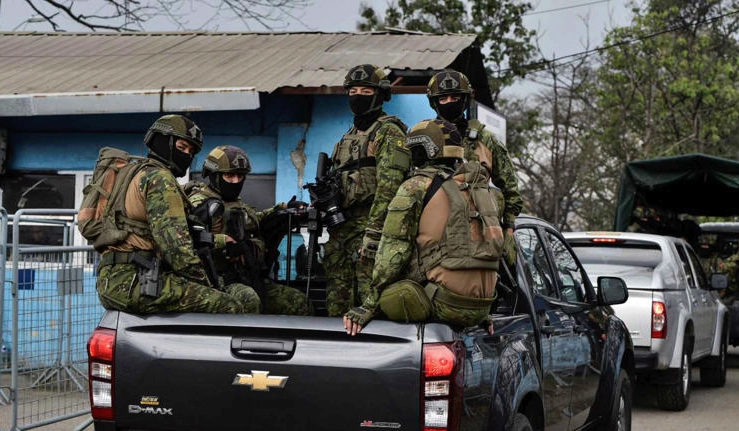Jamil Mahuad, former president of Ecuador, in a recent interview with the academic Manuel Alcántara, former vice-rector of the University of Salamanca, reflected in Latinoamérica21 on the threats faced by several countries in the region and, in particular, his own, which is going through a severe crisis of violence and which he reduced to the expression that is the title of this article. Mahuad, currently a professor at Harvard University, shows his concern with the advance of drug trafficking in the region and points out that the violent actions of drug trafficking are increasingly bordering on narcoterrorism.
You only need to look at what has happened recently in his country, when Ecuadorian organized crime groups linked to the Sinaloa Cartel and the Mexican Jalisco Cartel New Generation took many cities by storm, leaving a trail of death and collective fear that has forced the government of Daniel Noboa to take emergency decisions to restore governability.
However, although Noboa has managed to control the situation, especially in the prisons, the threat is still latent, and the withdrawal of these groups will likely mean a step back and then two steps forward. We have already seen the operational capacity to assassinate Fernando Villavicencio, a presidential candidate, and more recently a deputy prosecutor, and to carry out actions that remind us of situations similar to those that the Sinaloa and Jalisco cartels have had in Mexico.
The most significant difference between Presidents Noboa and López Obrador, so far, is that the Ecuadorian has decided to name these attacks on the population by recognizing them as terrorism and act accordingly. Thus endangering his life, while the Mexican president continues to see it as a matter of organized crime. The fact is that there is a substantial difference between the two legal categories, both in the political stance of the person who today represents the Ecuadorian state and in the dissuasive actions of the security system and, better, in the penalties against the members of these international organizations.
Certainly, so far, the initiative that considered Mexican cartels as terrorists has come during the mandate of Donald Trump and was rejected by the government of López Obrador for being “an attack against national sovereignty”. However, the seriousness of the situation has not been enough for the Congress of the Union to at least discuss the figure provided for in the Penal Code (Article 139) of considering cartels as terrorist organizations. And considering this would lead to a fundamental change in the security policy, the policy of “hugs not bullets”, which after five years has a negative balance.
Returning to the expressions of former President Mahuad, he points out that the process of the advance of transnational crime in our societies goes through three moments:
1. Organized crime takes the initiative to advance in the process of capturing societies. The public authorities do not act beyond their reactive capacity, which means not taking legal figures to another level in such a way that, as in the case of Islamic jihad, they are considered a danger not only to the host country but also to the international community.
2. In the face of this operational freedom, the cartels will expand their infiltration in the economy through money laundering, in politics through municipal and state governments and their security forces, in the media and political parties, in political representation and its decisions, etc., which means a gradual weakening of the pillars of the democratic system.
3. Finally, in the face of government inaction, these groups end up capturing the entire government structure in such a way that a narco-state is formed.
In Mexico, we are in the second stage of this process of state capture. This situation is perceptibly manifested today in the frequent withdrawal of security forces in the face of the onslaught of armed groups in different regions of the country; in the physical elimination of candidates for elected office, as has just happened in Chiapas, Veracruz and Morelos, and in the extortion of agricultural producers (avocado and lemon growers, etc.), chicken sellers and even family tortilla businesses.
It cannot be dismissed that in different regions a similar operation to those of the 2021 state elections is underway, when the different cartels inhibited and promoted candidacies for positions of political representation and their most regrettable expression was the assassination of possible candidates.
In other words, in the so-called “biggest elections in history” that will take place in the spring, there is a player in the shadows who is acting openly. It is likely to become more visible as the electoral process progresses with no strategy in sight, beyond unofficial declarations, to contain and guarantee the non-interference of these groups and leave them to their own devices to impose their will.
The recent experience of Ecuador should be the obligatory reference to avoid further deterioration of public life. In Ecuador, a presidential candidate was assassinated. In Ecuador, they became aware that they cannot leave the initiative to organized crime groups, there they defend democratic institutions and fight against this growing threat to our fragile democracies. Let us hope that this inaction in Mexico does not end up teaching us a lesson as we move one step closer to the hell of a narco-state.
*Translated by Janaína Ruviaro da Silva from the original in Spanish.











